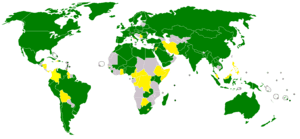
Space: the beneficial frontier.
That was the underlying theme of a panel called “The Future of Space,” which I moderated at the World Economic Forum’s annual meeting at Davos, Switzerland. It was the first such session on space services in the formal part of the program at this meeting of leaders in policy and business—and its focus was decidedly down to Earth.
“We want to educate people about the utility of space,” noted panelist Brian Weeden, technical adviser, Secure World Foundation. The panel discussed applications of orbiting satellites, including weather observations, climate studies, GPS location services, security—and even preserving cultural artifacts.
“Many of the world’s great global challenges can be effectively addressed by space-based satellites,” added panelist Ray O. Johnson, senior vice president and chief technology officer of Lockheed Martin.
“We are users of this technology especially for disaster relief,” said panelist Julien Anfruns, director-general, International Council of Museums. He showed images of war zones, where leaders can ensure that areas of cultural importance have not been damaged—or track whether they have been. Weeden noted the technology also has been used for war prevention in Sudan.
Along with the benefits come challenges, however. Growing services mean there are some 1,000 active satellites—and 21,000 pieces of debris bigger than 10 centimeter, with a much more vast number smaller than that (and still potentially dangerous). Other challenges include crowded communication bands, just as skyrocketing cellphone use creates crowding here on Earth, and even potential intentional signal jamming. Externally, solar storms, where the sun releases bursts of electromagnetic energy, could cause service disruptions on satellites, electrical power grids and mission launches.
The challenges are not only technological. Other areas of concern include finding good models for governance of this global common and updating legal frameworks, with are relicts of the Cold War. Eric Anderson, chairman and cofounder of Space Adventures, mentioned, for instance, the Outer Space Treaty of 1967. (See Anderson’s summary post of the session for the WEF blog here ).
At the end of the session, I asked each panelist what one thing he would like to see happen.
via Scientific American – Mariette DiChristina
The Latest Streaming News: The Future of Space updated minute-by-minute
Bookmark this page and come back often
Latest NEWS
Latest VIDEO







